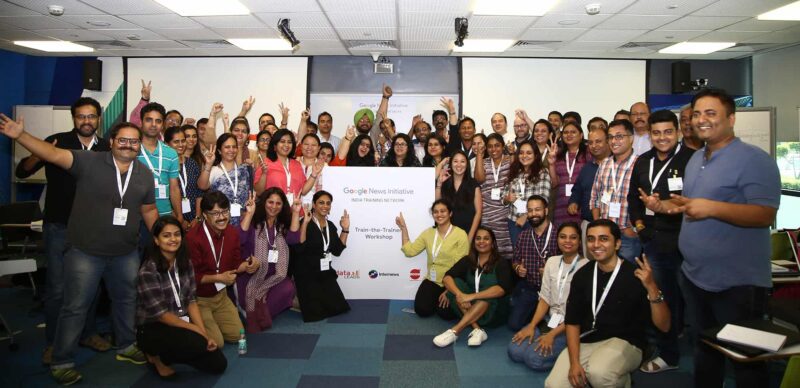It might seem harmless – a funny video of a man falling off a camel, spreading virally through India – but add in the suggestion that the man is actually a major party leader, and it begins to feed a narrative about politics that fuels misinformation and distrust in the lead-up to elections.
Before fact-checking took off in India, debates about this video and many other claims online would have just been that – debates and arguments that no one could really resolve. Without verified facts, when everything becomes a matter of opinion, it’s hard to expect anyone to make rational choices about candidates or policy.
But today, after a year of intensive training and investment across the country, we have a robust network of fact-checkers who are helping millions of citizens to land on actual facts.
The Google News Initiative India Training Network was launched in July 2018, a partnership between Google, Internews, DataLEADS, with technical and programmatic support from BoomLive and Alt News, First Draft and Storyful. Today, the network has trained more than 13,500 journalists and journalism students in more than 350 workshops conducted in newsrooms, colleges and press clubs in more than 75 cities and 10 languages.
All this work has led to a change. Making facts a part of everyday conversation and giving journalists the tools and know-how to trace a false claim is impactful.
Take the camel video – it might be convincing enough to say that the man in the video just doesn’t look like the leader in question. Or get a statement from the man denying the claim. But these aren’t facts.
The journalists at India Today’s Fact Check went many steps further. Using investigative tools like those covered in GNI trainings, they used reverse-search tools to find the video posted in many places. They used a TikTok ID to find the original poster on Instagram and make contact, find and verify the likely location of the video with Google maps, and, with the village located, used old-fashioned journalism skills to call around and find locals, ultimately landing on eye-witness testimonials to the video and the man in question (The video was shot at a wedding celebration and did not feature a politician).
While this may seem like a lot of research for a funny camel video, it’s the skill-building that is important. These same techniques are used to investigate rumors and misinformation around key events like the Pulwama attack, Balakot strikes, and general elections.
India Today’s Fact Check is just one of many initiatives and dedicated teams that have been empowered with fact-checking skills, tools and techniques as a result of GNI trainings. Using a train-the-trainer approach, journalists who have participated in GNI workshops have trained their own newsrooms, created desks and teams within newsrooms across the country and launched initiatives like Vishvasnews by Dainik Jagran, Times Fact Check by the Times of India, a weekly fact-checking column in Malayalam Manorama, a fact-checking section at The Hindu, fact-checking video shows by Business World and Khabar Lahriya and many more. GNI trainers also trained journalists in other newsrooms and press clubs.
Collectively, these trainers and the teams they trained have created hundreds of fact-checking stories to alert their audiences about viral misinformation. Their work also helped platforms like Google, YouTube and Facebook surface fact-checks in search results and in news feeds. Some trainers have gone a step further, conducting trainings for the general public, army officers, civil servants and even police departments.
“The GNI Training Network started with a small group of 39 Indian journalists and journalism educators a year ago,” said Syed Nazakat, founder of DataLEADS, an Indian digital media company. “It has eventually become one of the world’s biggest and most impactful fact-checking training networks, equipping a new generation of Indian journalists and media educators with tools and strategies to spot and debunk misinformation at a time when misinformation aided and abetted by social media is a growing problem that is threatening our lives and society. Our network is moving in multiple ways to build collaborations across India and share resources and tools to combat misinformation.”
Network workshops introduced these and other fact-checkers to best practices of nonpartisan and transparent fact-checking methodologies, and a number of news organizations have subsequently been verified as signatories of the International Fact-Checking Network (IFCN). India now has the maximum number of IFCN-certified fact-checkers than any other country in the world – it has 11 now (including AFP’s India team), up from only two in July 2018 when the program kicked off.
“Our trainers have worked very hard. Each one of them in their own unique way – some trained and sensitized their colleagues on best practices of fighting misinformation, others launched dedicated initiatives, some wrote fact-checking stories and columns in their publications while others focused on preparing future journalists in colleges. They all joined hands with just one aim in mind – to ensure that millions of their readers had access to nothing but the truth behind a viral piece of content. They are the real heroes of the program – the “Truth Warriors’ in this complex fight against misinformation,” said Surabhi Malik of Internews, who is the Program Director of the Google News Initiative India Training Network.
This network effect ensures that fact-checking has spread, almost virally, and become an accepted and depended-upon role of newsrooms in the country. Changing behavior, so that readers and audiences know that journalists are checking facts and can be trusted as reliable sources is the end goal – whether the content is a guy falling off a camel or something much more serious.
The journey to find a “perfect” solution to the misinformation problem will be a long and complex one, but this initiative has definitely been a big first step in the right direction.
